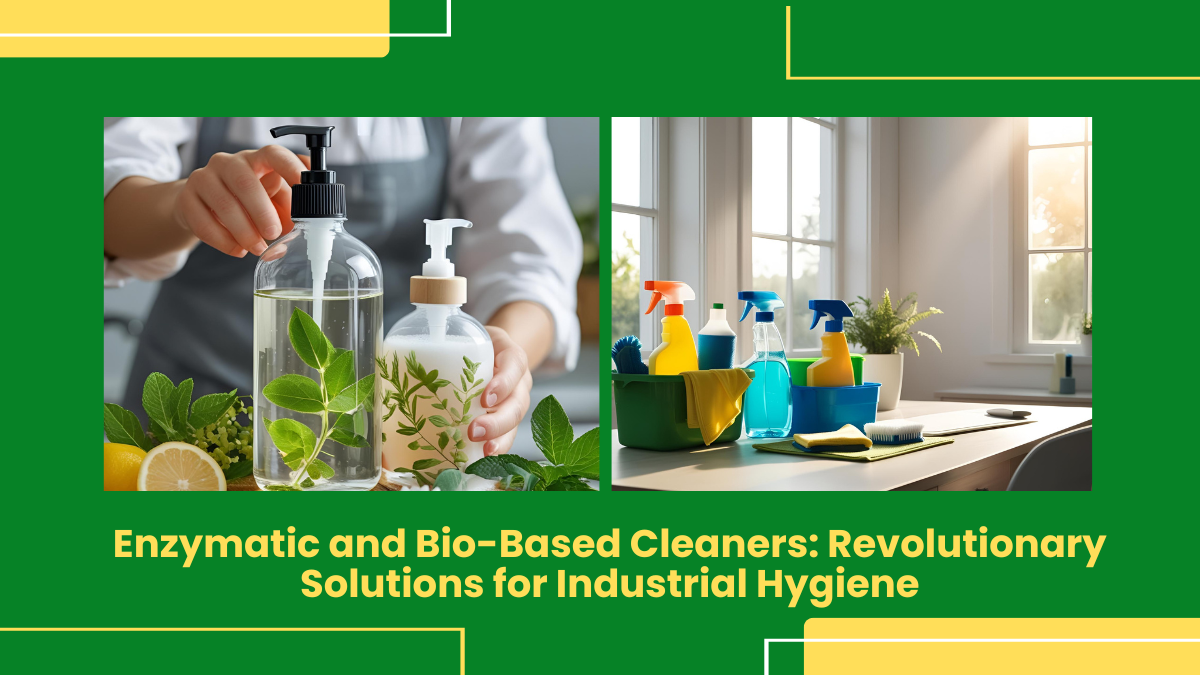Introduction: The New Era of Industrial Cleaning
Industrial facilities contend with stubborn organic residues—proteins, fats, starches—and ever-tightening regulatory standards. Conventional cleaners rely on caustic or solvent-based chemistry, which can corrode equipment, irritate workers, and leave toxic residues in wastewater. In contrast, enzymatic industrial cleaners employ living catalysts that digest soils, while bio-based agents use plant-derived surfactants that biodegrade fully. This fusion not only delivers more thorough cleaning but also aligns with modern ESG goals and green certifications.
What Are Enzymatic Industrial Cleaners?
Enzymatic Industrial Cleaners-Enzymes are proteins that accelerate specific biochemical reactions. In cleaning, four enzyme classes are most important:
- Protease: Hydrolyzes peptide bonds in proteins such as blood, dairy, and food residues
- Lipase: Cleaves fats and oils into water-soluble components
- Amylase: Breaks down complex carbohydrates and starches
- Cellulase: Deconstructs cellulose-based soils on fabric or plant-fiber surfaces
Unlike traditional detergents that merely emulsify or dissolve soils, enzymes digest contaminants into small, water-soluble fragments. They remain active as long as moisture and substrate are present, providing ongoing cleaning and deodorizing effects.
What Makes Bio-Based Cleaners Different?
Enzymatic Industrial Cleaners-Bio-based cleaners feature surfactants and solvents derived from renewable botanical sources—such as coconut, corn, and sugarcane—that:
- Biodegrade completely, minimizing ecological impact
- Contain no phosphates or volatile organic compounds, meeting stringent Green Seal® and ISO 14001 criteria
- Are gentle on surfaces, avoiding corrosion or abrasion
When paired with enzyme cocktails, these surfactants enhance soil penetration and stabilize enzymatic activity under industrial conditions.
Top Benefits of Enzymatic Industrial Cleaners
- Superior Cleaning Efficiency
Enzymatic Industrial Cleaners-Enzymes penetrate microscopic crevices, digesting organic matter where traditional cleaners fall short. This reduces manual scrubbing and repeat cycles. - Continuous Action
Treated surfaces continue to self-clean for hours post-application, improving long-term hygiene and odor control in high-traffic or biofilm-prone areas. - Enhanced Worker Safety
Formulations are non-toxic and non-irritating, minimizing respiratory and dermal hazards and reducing reliance on extensive personal protective equipment. - Environmental Sustainability
Enzymatic Industrial Cleaners-Full biodegradability and low chemical oxygen demand in effluent help facilities meet wastewater regulations and sustainability targets. - Surface Compatibility & Asset Longevity
Enzymatic and plant-based cleaners are non-abrasive, preserving equipment finishes and extending the service life of machinery, floors, and stainless-steel components. - Resource Savings & ROI
Although unit costs can be 10–20 percent higher, facilities often see 30–50 percent reductions in cleaning time, 25–40 percent water savings, and 15–25 percent lower downtime, delivering payback within 6–12 months.
Industrial Applications
Food & Beverage Manufacturing
Enzymatic Industrial Cleaners-Enzyme blends remove protein, fat, and starch residues from conveyors, tanks, and pipelines, ensuring compliance with food safety standards without lengthy rinse cycles.
Pharmaceutical & Biotechnology
Gentle amylase and cellulase formulations strip biofilms from cleanrooms and filling lines without damaging sensitive instruments, supporting sterile processing protocols.
Heavy Industry & Manufacturing
Multi-enzyme degreasers tackle cutting oils and lubricants on machinery and shop floors, reducing manual labor and preserving metal surfaces.
Facility Management (Washrooms & Cafeterias)
Enzymatic cleaners eradicate odors at their source by digesting organic waste, while bio-based surfactants maintain hygienic surfaces without noxious fumes.
Transportation & Logistics
Enzymatic Industrial Cleaners-Low-foam enzymatic sprays clean engine bays, containers, and loading docks in poorly ventilated areas, enhancing air quality and safety.
How to Choose the Right Enzymatic Industrial Cleaner
- Assess Soil Types: Enzymatic Industrial Cleaners-Select protease for proteins, lipase for fats, amylase for starches, and cellulase for plant fibers.
- Verify Surface Compatibility: Confirm non-abrasive ratings for metals, plastics, ceramics, and sensors.
- Check Certifications: Look for Green Seal®, EcoLogo®, and ISO 14001, and sector-specific approvals (e.g., FDA, EHEDG).
- Optimize Dilution: Follow manufacturer guidelines—typically 0.5–2 percent v/v—for cost-effective performance.
- Maintain Optimal Conditions:Enzymatic Industrial Cleaners-Store at recommended temperatures (10–30 °C) and pH (7–9) to preserve enzyme activity.
Cleaning Calls For Eco-Germ O Finish For Floor & Surface
Ecochem has stored its foot firmly in the cleaning industry as a fast-growing brand that delivers peak customer satisfaction and quality products. The company strives for sustainability and green future, with a mission of “Green India, Safe India”. Our research and development team values the manufacturing of organic, natural, and hygienic products which do not have harmful effects on the user or the environment. Our R & D team offers safe and sustainable solutions to all our partners. We at Ecochem believe in providing our customers with acid-free green cleaning products that add an extra bright finish. Our user-friendly disinfectant products provide maximum safety against coronavirus and kill 99.99% of microbes.
Cleaning Calls For Eco-Greener (Multi-Purpose Cleaner)
Ecochem is growing as a company by offering safe cleaning chemicals at reasonable prices. Our Economical green cleaning products include Eco-Greener – a multi-purpose cleaner. The formulation of user-friendly green cleaning products keeping in mind the safety of users and cleaning staff. Eco-Greener composition offers hygienic and acid-free green multi-purpose cleaning for different areas and spaces.
Ecochem’s Sustainable Cleaning Solutions
Ecochem’s flagship enzymatic and bio-based cleaners are formulated for Indian industries:
- Eco-Green BioClean Pro: Multi-enzyme degreaser for heavy-duty manufacturing lines.
- Eco-Enzyme Wash: Food-grade cleaner compliant with FSMS and HACCP.
- Eco-Germ O Finish: Biodegradable surface disinfectant for washrooms and cafeterias.
Enzymatic Industrial Cleaners-Sourced from local biomass, these products reduce supply-chain emissions, offer competitive pricing, and come with technical support to optimize your hygiene protocols.
Implementation Best Practices
- Staff Training: Conduct hands-on workshops focused on correct dilution, application, and safety.
- Pilot Testing: Begin with high-risk zones (food prep, cleanrooms) and track metrics like cleaning time and water usage.
- Automation Integration: Pair enzymatic cleaners with Clean-In-Place (CIP) systems and robotic scrubbers for consistency.
- KPI Monitoring: Measure water consumption, chemical use, downtime, and health incidents to quantify benefits.
- Equipment Maintenance: Regularly inspect dosing systems and store products within recommended environmental ranges.
Challenges and Misconceptions
- “Enzymes work too slowly.” They begin acting within 5–10 minutes and remain active post-rinse, often outperforming harsh chemicals that require repeat applications.
- “They’re too expensive.” Total cleaning costs (labor, water, downtime) can drop by 30–40 percent, yielding ROI within one year.
- “Only for niche sectors.” Modern formulations handle heavy oils and complex soils, making them versatile across industries.
Future Trends
- AI-Driven Dosing: IoT sensors and machine learning will optimize enzyme concentrations in real time.
- Sequential Enzyme Release: Phased enzyme cocktails for layered soils will enhance performance.
- Circular Packaging: Compostable or refillable containers will further reduce environmental impact.
Bespoke Enzyme Libraries: Tailored blends developed through high-throughput screening will target unique facility challenges.
FAQ’s
What makes Enzymatic Industrial Cleaners eco-friendly?
They use biodegradable enzymes and plant-derived surfactants, producing no toxic residues or VOCs.
Can they handle heavy industrial grease?
Yes. Lipase-rich formulas digest oils at a molecular level, often outperforming solvent-based degreasers.
Are these products safe for food-contact surfaces?
Many carry FDA and EHEDG approvals, ensuring compliance with food safety standards.
How quickly do enzymes work?
Typically within 5–10 minutes, with continued action post-rinse for lasting cleanliness.
What is the typical ROI timeframe?
Facilities often recoup their investment within 6–12 months through savings on water, labor, and downtime.
Written By : Vinny Jain


